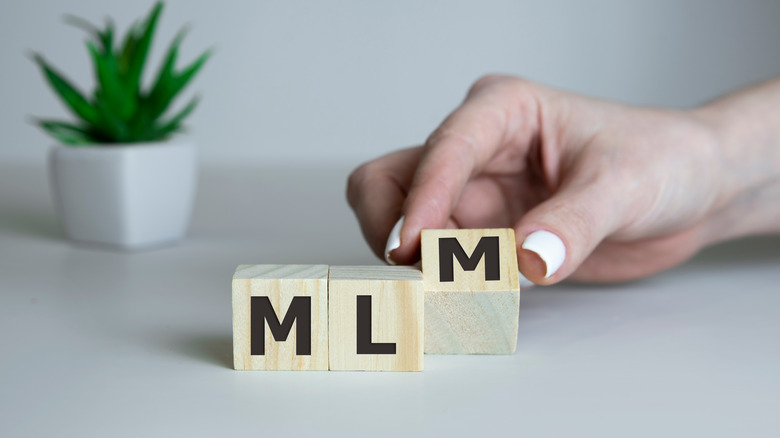Is Isagenix An MLM?
Isagenix bills itself as something of a total wellness company, offering everything from nutrition shakes to skincare serums that promise to help you "feel better, eat better, move better, and look better." (via Isagenix). And if you are active on social media, it's possible you have a friend or two who seems to be talking up the company like crazy and maybe even inviting you to try the products or join in selling them. This likely means that friend of yours is an "associate" of Isagenix, meaning they participate in direct sales of the company's products to their own friends, neighbors, and general customer base.
But what does it actually mean to be a direct sales "associate" of a company like Isagenix? If you've heard this company is in fact a multilevel marketing company (or MLM for short), you might wonder if it's true. We are here to tell you: yes, it's true. Isagenix is an MLM (via Travelling Jezebel). But what does that actually mean with regard to how the business functions and the roles "associates" actually play?
How MLMs like Isagenix work
According to Investopedia, an MLM company is one that "encourages existing members to promote and sell their offerings to other individuals and bring on new recruits into the business. Distributors are paid a percentage of their recruits' sales. New recruits become the distributor's network or downline and are, in turn, encouraged to make sales to earn money." In other words, when "associates" of an MLM like Isagenix tell you they are involved in direct sales, it's true; they really do sell a product directly to customers. But that's not the whole story.
In order to make a profit in a business like this, "associates" need to not only sell a significant amount of product, but they also need to recruit people underneath them to sell a significant amount of product, and so on and so forth. The reason this type of business model often gets compares to a pyramid scheme is because this type of upline/downline model does look rather exactly like a pyramid on paper. What keeps businesses like Isagenix legal and not considered a pyramid scheme is the fact that they do sell an actual product.
The reason such companies get a bad rap, however, is unless you are constantly recruiting people underneath you, you won't make much (if any) money. In fact, only about 25 percent of MLM sellers make any profit at all (via Fundera). That means that roughly 75 percent of all MLM sellers and "associates" never make a profit.

